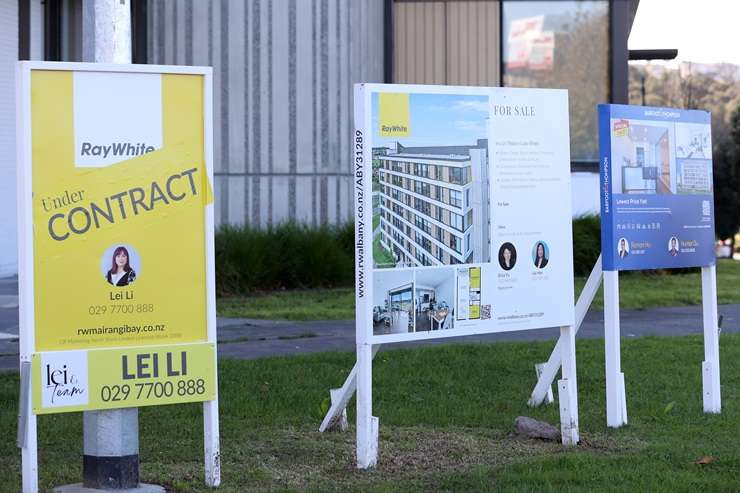The Reserve Bank's "savage" monetary policy has driven a double dip recession which has hurt New Zealanders pockets more than the headline numbers suggest, Kiwibank chief economist Jarrod Kerr has told OneRoof.
Kerr says New Zealanders are right to be concerned about rising unemployment, continued economic uncertainty and record numbers of New Zealanders departing our shores, but it is the harsh reality of the Reserve Bank's push to bring inflation under control.
“What we’re seeing is the impact of pretty savage interest rate increases over the last couple of years. You get a debt burn, you get a recession and then it shows up in the labour market,” Kerr says.
Discover more:
Start your property search
- Tony Alexander: Tear up the rulebook on mortgage rates - volatility is here to stay
- Aucklanders buy Omaha beach spot for $135,000, sell it for well over $4.5m
- ‘Crikey’: Waikato home comes with a near-extinct forest
But if households can hold on to the end of 2024, the pain may ease.
Consumer Price Index figures for April showed annual inflation sitting at 4%, the lowest since its 7.3% peak in June 2022, but still above the Reserve Bank’s target range of 1-3%.
New Zealand officially fell into recession in the final quarter or 2022 before bouncing back mid 2023 but by the second half of 2023 the economy took a dive again, says Kerr.
“Looking at nominal GDP, it looks quite shallow but it’s still a recession. But when you delve a bit deeper into what that means in terms of each New Zealander, it’s quite deep. It’s a 3% contraction for each person’s slice of the economy, which is worse than we thought.
“We’ve seen that in the retail sales numbers. Your share of the economic pie, my share of the economic pie has declined more than what the headline numbers are telling us.”

Real estate signs in Auckland. Kerr thinks house prices will rise if the central bank starts cutting the OCR in November. Photo / Fiona Goodall
Record net migration has helped to keep some of the numbers in check, but the Reserve Bank rate hikes have taken mortgage rates to a point that has hurt households and businesses and record migrants coming to New Zealand isn’t enough to stave it off, he says.
“There’s a bit of seasonality in refixing mortgages. Most action happens over the spring and summer months. In 2022 we saw people rolling off 2 % to 2.3 % levels, and then on to 5 % and 6 %, at the end of 2022. They refixed for a year and then got slapped again with more increases in the second half or the latter half of 2023,” says Kerr.
And there is still a little more pain to come.
Kerr says he is expecting mortgage defaults to increase alongside the unemployment rate, adding we are now at a point where businesses are being forced to lay off staff, which is concerning.
“There's a very close correlation there with unemployment rates rising and people being forced to default on their property. It’s not going to snowball like we saw in the 90s, but it will increase.”
The economic outlook was also leading to more New Zealanders looking overseas as we tallied up record migrant departures.
While New Zealand experienced a record annual net migration gain of 126,000 in the December 2023 year, the largest net migration gain since the record of 134,400 in the October 2023 year, Statistics from Stats NZ show record numbers of Kiwis are still leaving our shores, many for Australia.
Stats NZ immigration figures for the year to February 2024 saw two annual records for New Zealand citizens. There were 74,900 migrant departures, exceeding the previous record of 72,400 in the February 2012 year and net migration loss of 47,700, exceeding the 44,400 in the February 2012 year.
“I can see why Australia is attractive. Their central bank wasn’t as aggressive on interest rates and while the housing market is still unaffordable, it’s not as unaffordable as New Zealand,” says Kerr.
He says even with the Reserve Bank’s harsh measures New Zealand is still suffering from a critical imbalance between supply and demand in the housing market which showed no signs of abating and was being exacerbated by continued regulatory hurdles and infrastructure deficiencies.
Developers are reluctant to undertake new projects in the current environment and that is precisely what we don't need, says Kerr.
“When you're developing, you want to be comfortable that when you've finished your development, you can sell it, and there's no confidence there at the moment,” he says.

Reserve Bank of New Zealand governor Adrian Orr. Photo / Getty Images
“There are a lot of builders out there that had a fantastic pipeline a year to a year and a half ago, but a lot of it has dried up now,” says Kerr.
He is still hanging his hat on a turnaround toward the end of 2024, however.
“In terms of New Zealand viability long term, I'm more than happy to put some pretty strong conviction that we are going to be in a better place this time next year,” says Kerr.
He is anticipating rate cuts by the Reserve Bank by November to start alleviating the financial burden on households and mortgage rates projected to decrease by 100 basis points over the next year, fostering a more stable market environment.
The next test will be spring of this year.
“Hopefully we'll see things bouncing back on expectations of Reserve Bank rate cuts starting in November. If that happens, it'll just bring enough confidence back into the market that we think that will lift house prices around 5% to 7% this year, and then probably a similar gain next year,” says Kerr.
“These are solid gains, but not ridiculous like we've seen in the past. When we see the central bank cutting, households are going to breath a sigh of relief.”
- Click here to find properties for sale

















































































